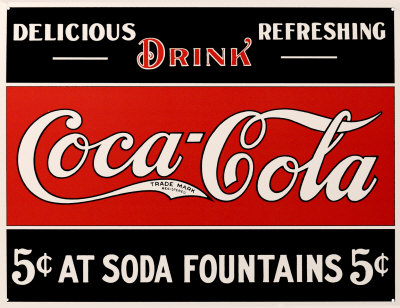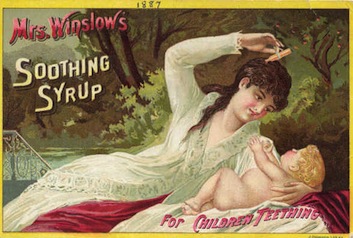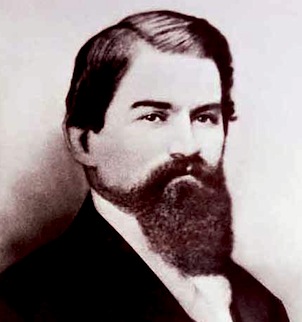The Last Patent Medicine -- John Pemberton and the Start of Coca-Cola
Dan Bryan, July 31 2012
 An early ad for Coca-Cola
An early ad for Coca-ColaCoca-Cola is the most famous brand in the world, and for a century has been one of the most profitable as well. In contrast to the drink's success its inventor, a certain John Pemberton, died in poverty from cancer -- his last years spent as a dissolute morphine addict.
Pemberton did not create the drink's recipe from thin air. He adapted to his times and produced what was initially a patent medicine. Even the name comes from the alliteration of its main ingredients -- the coca leaf and the kola nut. While the drink has survived far longer than its contemporaries of the 1880s, it comes from a long American tradition which John Pemberton tapped into.
A milieu of questionable cures
The patent medicine craze reached its heights in the years after the Civil War. Its advertising kept the newspapers in business, and travelers complained of seeing entire mountains clear cut to be replaced with outlandish billboards. The ads were always meant to appeal to the lowest common denominator, and their bombastic claims assaulted the senses of America's more enlightened citizens.
The content of such medicines was always questionable. Mercury, opium, and morphine were some of the more potent ingredients that turned up. Many other concoctions were little more than placebos, purported by salesmen to cure arthritis, chronic pain, and cancer. In an age when established medical practice was of questionable quality, these products filled a void in the landscape and many of them sold quite well.
 Morphine was the key ingredient in Winslow's Soothing Syrup.
Morphine was the key ingredient in Winslow's Soothing Syrup.In the South, a Confederate veteran named John Pemberton concocted and sold a large number of these mixtures in the years after the Civil War. While he was known to produce a higher quality product than most, his financial acumen was lacking. He drifted from one venture to another, squandering whatever profits he got ahold of on dissolute ventures, ill-advised loans, and an increasingly severe morphine habit. He probably produced no less than ten separate medicines over the course of the 1860s and 70s, constantly refining his craft with a study of chemistry and biology.
Vin Mariani, a wine and cocaine elixir fit for the Pope
By the 1880s, a particular elixir had gained tremendous popularity in the patent medicine market. It was a mixture of wine and cocaine called Vin Mariani. Invented in Corsica, this product arrived in America with the endorsement of luminaries such as Thomas Edison, Jules Verne, and Pope Leo XII. Ulysses Grant was said to have written his final memoirs (in frenzied fashion) with the aid of Vin Mariani in the months before he died.
Cocaine was widely praised at the time for its medicinal qualities. It was known to increase the powers of concentration, to relieve headaches, to stimulate the intellect, and to provide a boost of energy for those engaged in physical exertions. Some even believed that the drug could provide a cure for morphine addiction.
The latter effect was what Pemberton hoped to achieve. Throughout the early 1880s he honed his recipe until he created "Pemberton's French Wine Coca" and began selling it in the Atlanta area. The initial response from his customers was quite positive, and Pemberton believed he had finally found his ticket to fame and financial security.
An unfortunate legal turn, and the start of Coca-Cola
No sooner did Pemberton create his new beverage, however, when a campaign for alcohol prohibition began to sweep across Georgia. In the election of 1885, Atlanta and Fulton counties voted on the issue and resolved to become completely dry counties the following year. Vin Mariani and its knockoffs would soon become a thing of the past.
Realizing he would be back to where he started without a new recipe, Pemberton removed the wine and began mixing other substances with the coca leaves he had. Most of the drinks were far too bitter, so he added sugar. This made the consistency too thick, and he added citric acid to compensate. Carbonated water, also known for its health properties at the time, was used as a base. Finally, in 1886, Pemberton was satisfied that he had created a palatable substitute for wine coca -- a "temperance drink" as he called it. An associate named Frank Robinson coined the name "Coca-Cola" after two of the main ingredients.
 John Pemberton
John PembertonIndeed, Pemberton had successfully replaced the wine and cocaine drink with a far more wholesome mixture of soda and cocaine -- just in time for prohibition to take hold in Atlanta. Initial sales and feedback were quite promising, and there was a good deal of repeat business among the locals.
Pemberton's final days
Unfortunately, Pemberton's business sense failed him again when it came to Coca-Cola. After a promising start he sold shares of his concern to several different people. He gradually diluted his own holdings down to almost nothing and began working on a competing product. These actions sowed the seeds of numerous legal battles and maneuvering among his successors.
None of this was relevant to Pemberton himself. On August 16, 1888 he passed away from cancer. It would take the efforts of a very different man to turn Coca-Cola into a national soda drink.
Recommendations/Sources
- Mark Pendergast - For God, Country, and Coca-Cola
- John Stith Pemberton

